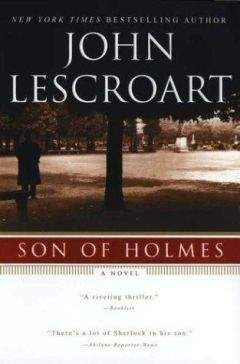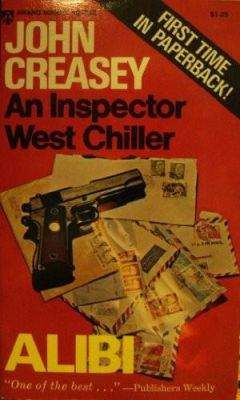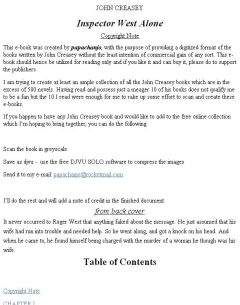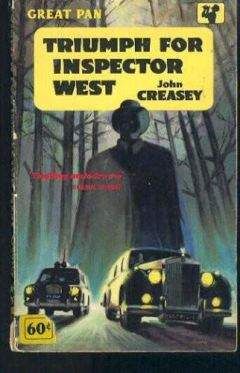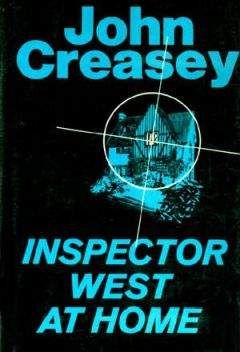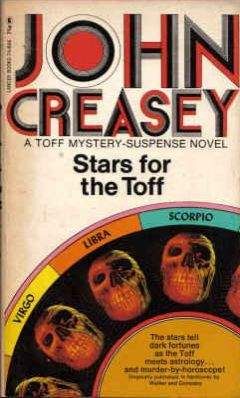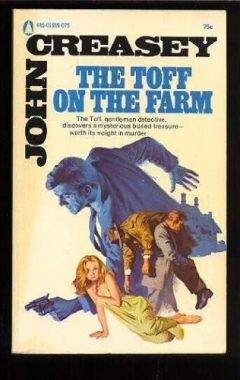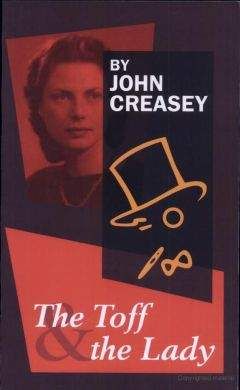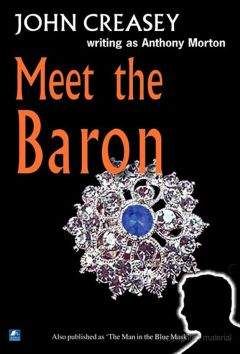John Creasey - Send Superintendent West

Скачивание начинается... Если скачивание не началось автоматически, пожалуйста нажмите на эту ссылку.
Жалоба
Напишите нам, и мы в срочном порядке примем меры.
Описание книги "Send Superintendent West"
Описание и краткое содержание "Send Superintendent West" читать бесплатно онлайн.
It was after twelve o’clock noon. The house had been visited by a Yard man, posing as an Electricity Board official, but no one had answered his knock.
Across the river, at the window of a warehouse, Sloan was standing with a pair of powerful binoculars. Two other detectives also watched, too far away to be of help if help were needed, but near enough to observe all comings and goings to the house, which had no number, just the name: “Rest”. The porch was covered with pale-green tiles, the front door and all the woodwork was of light brown, green tiles covered the gabled roof.
The garage was at the back of the house.
Roger drove along the narrow road leading to “Rest”, passed the beech trees and felt cut off from everyone as he drew up to the white garage doors.
There was ample room for the Austin, which was bigger than most made in England. The electric light and back daylight shone on the glossy black bodywork, the sleek lines. Roger opened the driving-door, sat at the wheel, looked in all the pockets and the glove compartment. Then he got busy, searching for prints. It took him five minutes to make sure that the car had been cleaned up thoroughly. Later, there could be an inch-by-inch examination; now, he had more urgent work to do.
He went out of the garage, turned his own car and approached the house. The only sound was the lapping of water nearby, the chirping of birds. From the house, silence. He studied the back door, and tried the handle. It was locked.
He walked round the house on crazy paving, neatly laid, no trap for careless feet The lapping of the water grew louder. The sun shone bright on the rippling river. He reached the front door, and knocked sharply; after a pause he knocked again, then rang the bell.
He glanced over his shoulder.
No one was in sight; no one had been in sight since he had left Peel two hundred yards away where this little private road led off the main highway. Peel had wanted to come with him; would have followed, if he hadn’t received strict instructions to stay put. Had that been safe? Was he safe? Did the trees conceal watchers, men who would slit another’s throat?
Roger tried the handle, but this door was also locked. He walked to the nearest window; examined it, and discovered that it would not be easy to force. If all the windows were the same, he might have to break one in order to get inside. He had no search warrant, but Hardy would cover him for that
Retracing his steps round the house, he tried a skeleton key in the back door; after a lot of twisting and turning, it worked, but he found that the door was bolted. Close by, he found a small window with a fastener he could reach with a long nail file. In five minutes he climbed into the kitchen. There was no sound. He shut the window and walked slowly across to a door leading into a square hall; there was no passage, only three other rooms, two on the right, one on the left; and a flight of stairs, carpeted from wall to banisters; the hall floor was also covered by a fitted carpet. His footsteps were muffled by dark-fawn pile. He went straight to the front door, unbolted and opened it and stood for a moment on the porch, not waving, but making sure that Sloan had time to see him. Then he closed the door and went inside again.
The three downstairs rooms were bright, airy and pleasant; there was nothing striking about them or the furniture. Homely but well-to-do folk lived here. On a baby grand piano were several photographs, all of the same woman; an attractive woman whose pictures here ranged over fifteen to twenty years. There was no photograph of a man.
Roger went upstairs, the only sound the faint rub of his clothes, cloth on cloth, and his soft footfalls. He found himself whistling softly, under his breath. This was exactly as he had expected, but there was something else: his own mood of expectancy. Fearful expectancy?
There were four bedrooms, two bathrooms; all were spotless but for a light dust, comfortable, pleasantly furnished in a bleak modern way, all empty. Yet two of the bedrooms had the air of being lived in. A woman’s coat lay over the back of a chair, a piece of tissue, dabbed with lipstick, was in a small wastepaper basket, together with a twist or two of blonde hair. There were more pictures of the same woman, but once again Roger could see no photograph of a man. He began searching the bedrooms, twenty wasted minutes irritating him.
There were no men’s clothes in any wardrobe, no shaving-gear, no tell-tale oddments. They could have been taken away, Roger mused, but more likely no man lived here, only Mrs Norwood.
An hour after he had arrived he drove off. The only thing he took away was an impression of a key, in soap, of the back door. This door he left locked; but he was careful to pull back the bolt which secured the door on the inside.
• • •
From the Yard, Roger telephoned the Surete Nationale; a Paris acquaintance was quick to understand and to promise to look for Mrs Norwood, but not to let her know she was being watched. Unfortunately, it might be days before a Paris report came through — and Ricky Shawn was in the hands of murderers.
Roger had full local reports on what little was known about the woman and several conflicting descriptions of her regular boyfriend; all agreed on one thing only — that he was middle-aged.
After three o’clock that afternoon, when the telephone rang, he was ready for anything — except a call from Paris. A French Inspector, with good English, was in triumphant mood.
“This Mrs Norwood, Superintendent. I think we have found her.”
Roger’s heart leapt.
“Wonderful!” It was almost too good to be true.
“It is not so bad, you admit. She answers the description you gave me. She gives her true name. She is at the Hotel de Paris, on the Boulevard Madeleine. Also, she has been there before. We have seen her before.”
Roger said tensely: “Go on.”
“We questioned the man who was then with her. A Mr Jack Gissing. Gissing.” The Frenchman spelt the name out carefully. “At the time, we asked you for information about this man. It was three — no, four months ago. You will have a record, perhaps?”
“We’ll have a record!” The breaks always came when they were least expected. “I can’t say thanks enough,” Roger said, fighting down excitement.
Very soon, he was going through the records of a man who was known as Gissing, a wealthy man of independent means. Nothing was known against him except that he had some mysterious way of outwitting most currency regulations. It was surprising how little had been learned about him. The French had suspected him of smuggling, but had been able to prove nothing.
Roger sent for the Sergeant who had made the inquiries, a dark-haired, chunky Cornishman, who had interviewed Gissing on his return to England. The man had been living in a luxury service flat in Kensington, his passport had been in order, he had seemed amused by the investigation. What was he like? Not a man one would forget, but one difficult to describe. Not big, not small.
“We want the Home Office files for his passport photograph,” Roger said. “You’d better go for it — I’ll phone ‘em.”
It took time.
Marino telephoned, Roger promised news of a kind soon, and rang off. Had he been too abrupt? Much more abrupt than he would have been if Lissa had telephoned. He read the report on Gissing until he knew it off by heart; another case of a man of whom practically nothing was known, a vague past, an equally vague source of income. He did some buying and selling on the “Change, had some overseas balances which were blocked; no known American income or capital.
The Sergeant came back, as nearly flurried as a Cornishman could be.
“If that’s Jack Gissing, I’m a Chinaman,” he said, handing the passport photograph to Roger. “He might just pass with a photo like that, but more likely he changed the one on his passport. That won’t help with the Press, will it?”
“It won’t help with anything or anyone,” Roger said. “We’ll have to work on your description.”
Sloan took over, to send the description to ports and airfields in the hope that Gissing would be recognized. Roger, less buoyant, went to Grosvenor Square.
Herb had gone home. Lissa wasn’t there, but her presence seemed to linger. If Marino had been conscious of any telephone brusqueness, he had not let it worry him.
It was nearly seven o’clock.
“Hi, Roger,” Marino said, and waved to a chair. “You’ll have a drink, I know.” There was a tray on his desk, with Scotch whisky, rye, a gleaming cocktail shaker, a bowl of ice, salted almonds, pecan, cachou and peanuts. “What will it be?”
“Whisky and soda, please,” Roger said.
Marino poured the drinks from where he sat, stretching out his long arms, hardly leaning to the right or left; it was almost as if he couldn’t move his body. His big face had an amiable look, here was a man it seemed nothing could really ruffle — yet the kidnapping of Ricky Shawn had ruffled him. The cut of his grey coat was faultless.
He poured rye on to ice, for himself.
“Here’s to Scotland Yard,” he said, and drank. His eyes smiled. “So it hasn’t gone the way you hoped.”
“Not all the way,” Roger said, “but we’ve found the A70 used at Ealing, and other things have developed.” Marino went tense, and Roger told him exactly what he now knew, going on: “Much depends on how far Gissing was responsible for the kidnapping. I think we’ll catch up with him. There’s a chance that he’ll use the house by the river — else why send his light o’ love away. We’re having it watched. If Gissing knows where the boy is, we’ll find a way of making him talk. Perhaps we can use the murder of Ed Scammel as a lever. Know anything about Scammel?”
Marino said: “I called Washington. If they get a line on him, they’ll call back.”
“Good. If Gissing thinks he’ll have to face a murder charge, he’ll probably talk fast enough.”
“Could be, too. How long has Ed Scammel worked for Gissing?”
“At least three months. He has been seen driving the Austin around Barnes and Hammersmith at intervals for that period. We’re trying to find out who else Ed mixed with over here. He’s known to have had lunch once or twice a week with another American in a cafe at Hammersmith. The other man’s name takes some believing. It’s Jaybird.”
Marino smiled. “You’ll put the L in for him.”
“With luck, we’ll have some news about him tonight,” said Roger. “But we can’t hide the fact that we’re looking for an American citizen. The fact that one was murdered hasn’t leaked out yet — officially, the body’s not identified. But there are limits to how much we can keep secret I told you that on the telephone. I don’t think we ought to keep it all from the Press — or try to.”
“I said, use your own judgment,” Marino reminded him. “Keep doing that, and I’ll be happy. The thing I want is to hold the newspapermen off Shawn. That means keeping the kidnapping out of the newspapers. Can you do this?”
Roger said reluctantly: “So far, we have. The neighbour was satisfied without much trouble. Officially, Ricky Shawn has been sent into the country-neighbours won’t be surprised that he doesn’t show up in Wavertree Road. Officially there was a burglary at Number Thirty-one the night before last — nothing much stolen. It will get a paragraph or two in the local newspapers, but nothing in the daily Press.” Roger finished his drink, thought he heard a sound at the door, looked round and was disappointed. “What news have you got for me?”
“Nothing from the States,” Marino said. “Belle Shawn is still under Carl’s sedation. Shawn hasn’t left his house. I asked him to come and see me, but he refused. Don’t tell me about Mahomet and the mountain.” Marino was still urbane, had himself under much stricter control than the previous morning. “Shawn wants to pack up and go home as soon as Belle is fit to travel.”
“No more messages?”
We haven’t intercepted any on the telephone,” said Marino, “but one might have reached him, telling him to go back to the States if he wants to see the boy again.”
“Will you let him?”
“If Shawn goes home, we’ll never get him back — and we need him here.”
“Is that an answer?”
“We don’t want to have to keep him against his will. We want him to co-operate freely. There just isn’t a way of making a man do what he doesn’t wish to do, Roger — not if you want him to put all he’s got into doing it. You suggested the line we should take with him, and maybe we will, but whatever fine we take, it won’t alter basic facts. You’re right in this way: even if we get Ricky back, Shawn will still think of future danger, so to hold him, we have to get the boy back and also convince Shawn there’s nothing waiting for him round the corner.”
Roger said slowly: “I can’t tell you why I don’t like Shawn. I just don’t Perhaps it’s because you’re so concerned with him that you forget the other trifle.”
Marino looked his question.
“A ten-year-old boy, highly strung, used to having life made easy, was last known to be with McMahon, who probably slit Ed Scammel’s throat.”
“That’s right,” Marino said slowly. “First things first. To me, to a lot of other people, that boy isn’t vital because he’s a child having a hell of a time, only because of his influence on his father. So I’m cold-blooded. But does it make any difference? You want to get him back because he’s a boy, I want him back just as badly because he’s the son of his father. I held out on you about the reason for Shawn’s importance, because I had to. But you’re holding out on me for a reason I don’t know.”
Marino was quick; very quick.
“What makes you think so?”
“It just occurred to me, I guess. And to Lissa. It occurred to Lissa first. She said that she didn’t believe that you’d told us everything you’d been thinking. Lissa thinks you’re good, Roger — more than good, she thinks you’re red-hot She says you’ve a mind that jumps twice as fast and twice as high as the next man, and being English, you don’t talk much. I’ve known her for a long time, and she isn’t often wrong. What are you keeping to yourself?”
Marino spoke amiably enough; and waited patiently for an answer.
“A guess,” Roger said, and stood up. He glanced towards the door again, but it didn’t open; Lissa wasn’t coming. “We know that a child was taken to Ganda early yesterday morning, we know he was small for his age and thin, we don’t know that it was Ricky Shawn. It could have been a stooge. You, everyone in the hunt, would jump to the States as the likely place for them to take the boy. Gissing, of McMahon, or unknowns, would know which way we’d jump, give us plenty to jump after, and plant the boy somewhere else. With Mrs Clarice Norwood in Paris, perhaps. Or somewhere in England. We’re still getting reports at the Yard of all the boys around that age who left the country from three am. yesterday morning, and we could be fooled even if we do get word of them, because they could have dressed Ricky as a girl.
Подписывайтесь на наши страницы в социальных сетях.
Будьте в курсе последних книжных новинок, комментируйте, обсуждайте. Мы ждём Вас!
Похожие книги на "Send Superintendent West"
Книги похожие на "Send Superintendent West" читать онлайн или скачать бесплатно полные версии.
Мы рекомендуем Вам зарегистрироваться либо войти на сайт под своим именем.
Отзывы о "John Creasey - Send Superintendent West"
Отзывы читателей о книге "Send Superintendent West", комментарии и мнения людей о произведении.






